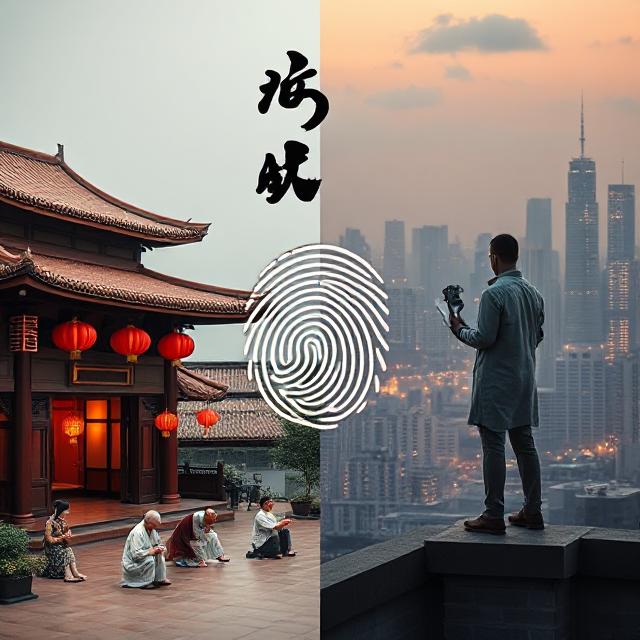
Table of Contents
Collective Identity in Confucianism vs Individualism in Liberalism
The contrast between collective identity in Confucianism vs individualism in liberalism illustrates two divergent visions of selfhood, society, and morality. One sees the individual as fundamentally relational, formed and bound by duties and roles. The other sees the individual as a sovereign unit, possessing rights and autonomy independent of social bonds. This article explores the philosophical, cultural, and ethical dimensions of both frameworks, unpacking how they continue to shape human behavior, institutions, and ideals.
I. The Confucian Model: Identity Through Relationship
A. Origins of Confucian Thought
Rooted in the teachings of Confucius (551–479 BCE), Confucianism emerged during China’s Warring States period. It sought social harmony through moral cultivation, hierarchy, and reciprocal duty.
B. The Relational Self
Confucianism defines the self through its relationships:
- Son to father
- Subject to ruler
- Friend to friend
- Husband to wife
- Younger sibling to elder sibling
These “Five Relationships” form the moral structure of society. One’s identity is not abstract but rooted in these concrete bonds.
C. Role of Ritual and Propriety (Li)
Confucian ethics emphasizes ritual conduct. Through li (rites), one internalizes appropriate behavior, aligning with societal and cosmic order. The self is shaped by fulfilling roles, not by seeking personal authenticity.
D. Moral Education and the Junzi Ideal
The junzi, or “noble person,” is cultivated through moral learning and communal responsibility. Personal desires are subordinate to harmony, duty, and respect for tradition.
E. Social Implications
Confucian societies tend to value:
- Hierarchical order
- Family obligations
- Deference to elders
- Harmony over confrontation
The group takes precedence over the individual.
II. The Liberal Model: The Autonomous Self
A. Historical Roots of Liberalism
Liberalism traces its roots to Enlightenment thinkers such as Locke, Mill, and Rousseau. It emphasizes individual freedom, natural rights, and rational self-governance.
B. The Self as Independent
In liberal thought, the individual exists prior to and apart from social roles. Identity is self-created, not assigned. Autonomy is the highest ethical value.
C. Freedom and Rights
Core liberal principles include:
- Freedom of speech and conscience
- Equality under the law
- The social contract
- Private property
These ideas form the basis of modern democracies.
D. Education and Self-Expression
Liberal education encourages critical thinking, self-expression, and moral autonomy. The goal is not conformity but self-realization.
E. Social Implications
Liberal societies emphasize:
- Individual rights over group duties
- Dissent and diversity of opinion
- Legal equality
- Self-ownership and personal responsibility
III. Core Differences at a Glance
| Dimension | Confucianism | Liberalism |
|---|---|---|
| View of Self | Relational, role-bound | Independent, self-defining |
| Moral Priority | Harmony, duty, role fulfillment | Autonomy, freedom, self-expression |
| Education Goal | Social conformity, moral cultivation | Critical inquiry, personal growth |
| Political Impulse | Hierarchical and paternalistic | Egalitarian and democratic |
| Social Behavior | Obedience and respect | Dissent and rights assertion |
IV. Strengths and Challenges of Each View
A. Confucianism: Strengths
- Deep social cohesion
- Strong family and community networks
- Respect for tradition and stability
B. Confucianism: Challenges
- Suppression of individual dissent
- Justification of hierarchy
- Resistance to reform or pluralism
C. Liberalism: Strengths
- Emphasis on personal freedom
- Protection of minority voices
- Innovation and diversity
D. Liberalism: Challenges
- Social fragmentation
- Weak communal bonds
- Excessive focus on individualism at the expense of the common good
V. Contemporary Crossroads
A. Hybrid Models Emerging
In the globalized world, pure Confucian or liberal frameworks are rare. Countries like South Korea and Japan blend Confucian social structures with liberal economies and political systems.
B. China’s Selective Confucian Revival
Modern China has revived Confucian values selectively to promote social order—without adopting liberal rights. This raises questions about whether Confucianism can be liberalized, or vice versa.
C. Liberalism Under Scrutiny
In the West, liberalism faces critiques of moral relativism and societal atomization. Thinkers now explore how communitarianism can restore a sense of shared purpose.
VI. Conclusion: Can Identity Be Both Relational and Free?
The debate between collective identity in Confucianism vs individualism in liberalism is not merely academic. It defines how we educate, legislate, and relate to one another. Neither approach is complete alone.
To be truly human is to be both in relationship and capable of choosing. As societies evolve, the future of ethics may lie in an integration—where roles ground us, and freedom elevates us.
